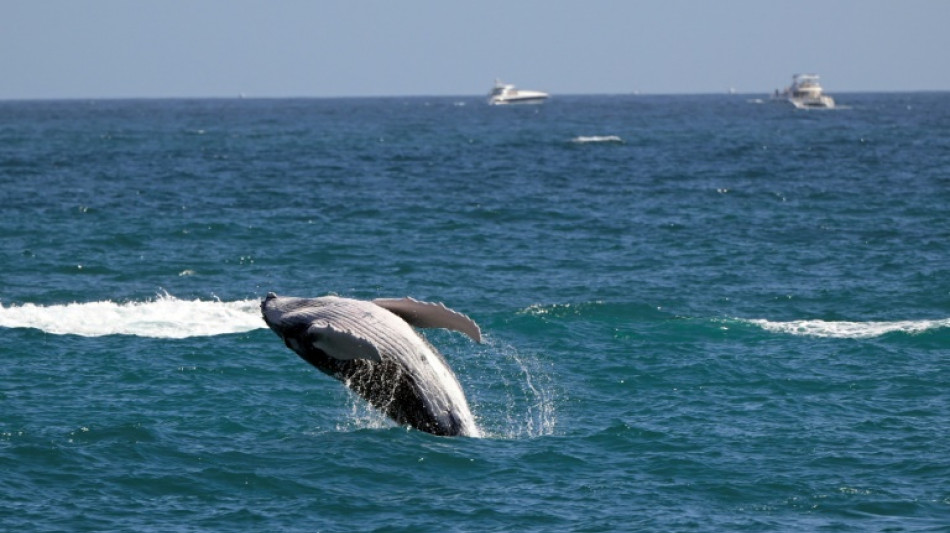
-
 Munsey leads Scotland to 207-4 against Italy at T20 World Cup
Munsey leads Scotland to 207-4 against Italy at T20 World Cup
-
Japan restarts world's biggest nuclear plant again

-
 Bangladesh poll rivals rally on final day of campaign
Bangladesh poll rivals rally on final day of campaign
-
Third impeachment case filed against Philippine VP Duterte

-
 Wallaby winger Nawaqanitawase heads to Japan
Wallaby winger Nawaqanitawase heads to Japan
-
Thailand's Anutin rides wave of nationalism to election victory

-
 Venezuela's Machado says ally kidnapped by armed men after his release
Venezuela's Machado says ally kidnapped by armed men after his release
-
Maye longs for do-over as record Super Bowl bid ends in misery

-
 Seahawks' Walker rushes to Super Bowl MVP honors
Seahawks' Walker rushes to Super Bowl MVP honors
-
Darnold basks in 'special journey' to Super Bowl glory

-
 Japan's Takaichi may struggle to soothe voters and markets
Japan's Takaichi may struggle to soothe voters and markets
-
Seahawks soar to Super Bowl win over Patriots

-
 'Want to go home': Indonesian crew abandoned off Africa demand wages
'Want to go home': Indonesian crew abandoned off Africa demand wages
-
Asian stocks track Wall St rally as Tokyo hits record on Takaichi win

-
 Bad Bunny celebrates Puerto Rico in joyous Super Bowl halftime show
Bad Bunny celebrates Puerto Rico in joyous Super Bowl halftime show
-
Three prominent opposition figures released in Venezuela

-
 Israeli president says 'we shall overcome this evil' at Bondi Beach
Israeli president says 'we shall overcome this evil' at Bondi Beach
-
'Flood' of disinformation ahead of Bangladesh election

-
 Arguments to begin in key US social media addiction trial
Arguments to begin in key US social media addiction trial
-
Agronomics Limited Announces Net Asset Value Calculation as at 31 December 2025

-
 UK-Based Vesalic Limited Emerges from Stealth with Landmark Discovery of Potential Non-CNS Driver of Motor Neuron Diseases, including ALS, and Breakthrough Therapeutic and Diagnostic Opportunities
UK-Based Vesalic Limited Emerges from Stealth with Landmark Discovery of Potential Non-CNS Driver of Motor Neuron Diseases, including ALS, and Breakthrough Therapeutic and Diagnostic Opportunities
-
Gotterup tops Matsuyama in playoff to win Phoenix Open

-
 New Zealand's Christchurch mosque killer appeals conviction
New Zealand's Christchurch mosque killer appeals conviction
-
Leonard's 41 leads Clippers over T-Wolves, Knicks cruise

-
 Trump says China's Xi to visit US 'toward the end of the year'
Trump says China's Xi to visit US 'toward the end of the year'
-
Real Madrid edge Valencia to stay on Barca's tail, Atletico slump

-
 Malinin keeps USA golden in Olympic figure skating team event
Malinin keeps USA golden in Olympic figure skating team event
-
Lebanon building collapse toll rises to 9: civil defence

-
 Real Madrid keep pressure on Barca with tight win at Valencia
Real Madrid keep pressure on Barca with tight win at Valencia
-
PSG trounce Marseille to move back top of Ligue 1

-
 Hong Kong to sentence media mogul Jimmy Lai in national security trial
Hong Kong to sentence media mogul Jimmy Lai in national security trial
-
Lillard will try to match record with third NBA 3-Point title

-
 Vonn breaks leg as crashes out in brutal end to Olympic dream
Vonn breaks leg as crashes out in brutal end to Olympic dream
-
Malinin enters the fray as Japan lead USA in Olympics team skating

-
 Thailand's Anutin readies for coalition talks after election win
Thailand's Anutin readies for coalition talks after election win
-
Fans arrive for Patriots-Seahawks Super Bowl as politics swirl

-
 'Send Help' repeats as N.America box office champ
'Send Help' repeats as N.America box office champ
-
Japan close gap on USA in Winter Olympics team skating event

-
 Liverpool improvement not reflected in results, says Slot
Liverpool improvement not reflected in results, says Slot
-
Japan PM Takaichi basks in election triumph

-
 Machado's close ally released in Venezuela
Machado's close ally released in Venezuela
-
Dimarco helps Inter to eight-point lead in Serie A

-
 Man City 'needed' to beat Liverpool to keep title race alive: Silva
Man City 'needed' to beat Liverpool to keep title race alive: Silva
-
Czech snowboarder Maderova lands shock Olympic parallel giant slalom win

-
 Man City fight back to end Anfield hoodoo and reel in Arsenal
Man City fight back to end Anfield hoodoo and reel in Arsenal
-
Diaz treble helps Bayern crush Hoffenheim and go six clear

-
 US astronaut to take her 3-year-old's cuddly rabbit into space
US astronaut to take her 3-year-old's cuddly rabbit into space
-
Israeli president to honour Bondi Beach attack victims on Australia visit

-
 Apologetic Turkish center Sengun replaces Shai as NBA All-Star
Apologetic Turkish center Sengun replaces Shai as NBA All-Star
-
Romania, Argentina leaders invited to Trump 'Board of Peace' meeting


Gray whales shrinking fast as climate warms
Pacific coast gray whales have shrunk in length an astonishing 13 percent since 2000, adding to evidence that climate change and other human activities are making marine mammals smaller, a study says.
Their diminished size could have big impacts on survival rates and reproductive success -- and trigger ripple effects throughout their entire food webs.
For the paper, researchers focused on the Pacific Coast Feeding Group (PCFG) -- around 200 whales that are part of the wider Eastern North Pacific (ENP) population of around 14,500.
Considered "ecosystem sentinels," they stay closer to shore, feeding in shallower, warmer waters, than the wider population that inhabits colder, deeper Arctic seas. Prior research had shown they are in worse shape than their counterparts, with smaller bodies, heads and flukes.
"Now we know they have been shrinking in body size over the past 20-40 years, which may be an early warning sign that the population is at risk of declining," Kevin Bierlich, an assistant professor at Oregon State University and co-author of the paper in Global Change Biology, told AFP on Thursday.
By analyzing drone images taken from 2016-2022 of 130 individuals whose age was estimated or known, the scientists found a striking trend: a gray whale born in 2020 is likely to reach a full-grown adult length of approximately 1.65 meters (5ft 5in) less than a counterpart born in 2000.
This represents a significant 13 percent decrease in the total length of mature gray whales, which typically measure between 38-41 feet in length.
Notably, the decline was more pronounced in females, who historically exceeded males in size but are now comparable.
It would be the equivalent of seeing the average height of an American woman plummeting from 5ft 4in to 4ft 8in over two decades.
- Size matters -
"In general, size is critical for animals," said Enrico Pirotta, lead author on the study and a researcher at the University of St. Andrews in Scotland.
"It affects their behavior, their physiology, their life history, and it has cascading effects for the animals and for the community they're a part of."
Smaller whale calves may have lower survival rates when they stop weaning, while for adults, the major concern is reproductive success.
The species relies on energy reserves stored during the feeding season to support the demands of migration and reproduction during winter -- and the question arises whether they are able to put enough energy towards reproduction and keeping the population growing.
Importantly, the study found the trend was correlated with changes to the balance of "upwelling" and "relaxation" cycles of the ocean.
Upwelling transports nutrients from deeper waters to shallower areas. During relaxation periods, these nutrients remain in the shallower zones, where light enables plankton and other small species that whales feed on to grow.
Climate change is known to be an important factor affecting the dynamics of this delicate balance, through changes in wind patterns and water temperature.
A smaller stature may not only hinder whales' ability to thrive, but also increase their vulnerability to threats such as collisions with boats and entanglement in fishing gear, which can be deadly.
S.F.Warren--AMWN


